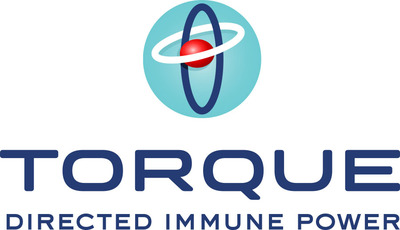

CAMBRIDGE, Mass., April 1, 2019 /PRNewswire/ -- Torque, a clinical-stage immuno-oncology company developing Deep-Primed™ T Cell Therapeutics to direct immune power deep within the tumor microenvironment, announced two preclinical data presentations for its cellular immunotherapy programs at the AACR (American Association for Cancer Research) Annual Meeting 2019. The presentations featured new preclinical data on Deep IL-12 Primed T cells and Deep IL-15 Primed T cells.

"We are rapidly advancing Torque's Deep-Primed immunotherapy pipeline into the clinic on the foundation of strong preclinical studies that include the Deep IL-12 and Deep IL-15 data we are presenting here at the AACR meeting," said Thomas Andresen, PhD, Chief Scientific Officer of Torque. "Both of these Deep-Primed T cell therapies drive an immune response that is focused locally in the tumor microenvironment, delivering concentrated doses of IL-12 and IL-15 cytokines that are out of reach using conventional systemic administration due to the potential for severe toxicities. We also presented compelling data for the combination of these surface-anchored cytokines—Deep IL-12 plus Deep IL-15—which are complementary in priming and boosting T cells' anti-tumor immune responses. This is a unique approach to cellular immunotherapy with significant potential to improve treatment outcomes for many patients with solid and hematologic cancers."
Highlights of the oral and poster presentations follow, and the oral presentation abstract and poster presentation are available on the Torque website: goo.gl/bnPeiL
Oral Presentation
Abstract #: 933
Title: Surface-tethered IL-12 improves tumor-specific T-cell therapy and enhances inflammatory activity in tumors without inducing systemic toxicities
Session: MS.IM02.04— Adoptive Cell Therapy
Date & Time: Sunday, March 31, 2019 | 3:05—3:20 pm EDT
Location: Room B405—Georgia World CC
Presenter: Doug Jones
Key findings from the study:
Tethering IL-12 to the immune cell surface with Deep IL-12 dramatically improves the efficacy of tumor-targeted cell therapy, while avoiding the toxicities associated with systemic IL-12, as demonstrated in the melanoma B16 mouse model:
Poster Presentation
Abstract #: 2244
Title: Deep IL-15 primed T cells synergize with PD-L1 blockade to overcome resistance to checkpoint immunotherapy
Session: PO.CL06.05—Combination Immunotherapies 1
Date & Time: Monday, April 1, 2019 | 1:00–5:00 pm EDT
Location: Poster Section 19
Presenter: Elena Geretti
Key findings from the study:
Deep IL-15 Primed T cells co-administered with checkpoint Inhibitor immunotherapy significantly improves efficacy with good tolerability in the melanoma B16 mouse model:
A regimen of Deep IL-15 Primed T cells in combination with PD-L1 blockade:
About TRQ-1501
TRQ-1501 is an investigational immune cell therapy produced from a patient's own T cells, which are primed to be active against multiple tumor-associated antigens and loaded with Deep IL-15 (a multimer of IL-15 cytokine) anchored to the T cells' surface. A Phase I/2 clinical trial of TRQ-1501 in solid cancers and lymphoma is currently enrolling (NCT03815682) and will evaluate TRQ-1501 both as a single agent and in combination with KEYTRUDA® (pembrolizumab), Merck's anti-PD-1 therapy.
About Torque's Deep-Primed™ Cellular Immunotherapy Platform
Torque is developing a new class of Deep-Primed™ cellular immunotherapy designed to overcome the key challenges limiting broad use of cellular therapy in oncology, including the capability to target tumors that express multiple heterogeneous antigens, the ability to overcome the immunosuppressive microenvironment that shuts down T cell function, and the need for outpatient treatment with a high margin of safety. Torque uses its Deep-Priming technology to develop multi-targeted, antigen-primed T cells that carry surface-anchored immune-stimulatory drugs to drive a full immune response within the tumor microenvironment against tumors with heterogenous antigens.
Torque's Deep-Priming platform uses advanced cell process engineering to:
Deep-Primed T cells both target multiple tumor antigens and pharmacologically activate an immune response with anchored cytokines. This process does not require genetic engineering of the T cells and so preserves the natural T cell receptor for delivering a regulated immune response, with the potential for a high margin of safety. In addition to antigen priming, immunomodulators are tethered to the surface of Deep-Primed T cells—initially IL-15 and IL-12 cytokines, and TLR agonists—that activate both innate and adaptive immunity. Administering these immunomodulators systemically to a patient can cause lethal toxicity by activating immune cells throughout the body. By loading precise doses of cytokines onto the surface of T cells, Deep Priming focuses the immune response to target the tumor, without systemic exposure.
In hematologic cancers, this new class of immune cell therapeutics has the potential to improve on the initial success of single-target CAR T therapeutics with expanded efficacy and also move cell therapy treatment out of the hospital with a high margin of safety. For solid tumors, Deep-Primed T cells have the potential to enable efficacy against tumors with heterogeneous antigens protected by hostile microenvironments, which are not readily addressable with the first generation of immune cell therapies.
About Torque (www.torquetx.com)
Torque is a clinical-stage immuno-oncology company developing Deep-Primed™ T cell therapeutics to direct immune power deep within the tumor microenvironment. Torque's lead product candidate—TRQ-1501 (Deep IL-15 Primed T cells)—is in Phase 1/2 clinical trials for solid tumors and hematologic cancers. The company is based in Cambridge, Massachusetts.
Contact:
Mary Moynihan
M2Friend Biocommunications
802-951-9600
mary@m2friend.com
SOURCE Torque
